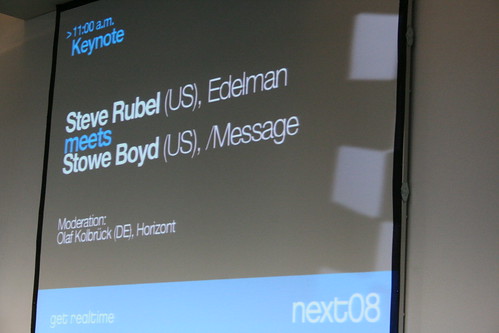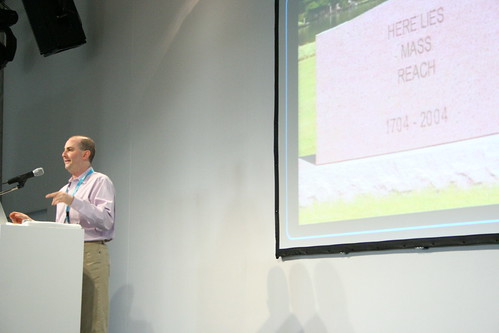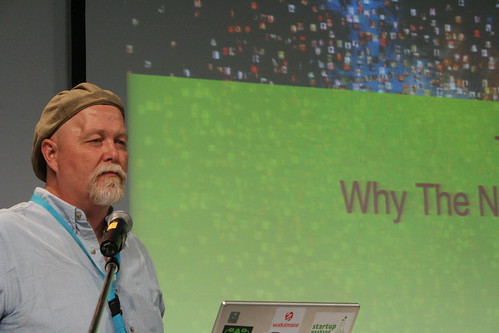My favorite Panel of the day, expectation-wise: Stowe Boyd meets Steve Rubel. This should be good. So let’s dive right in:

Steve Rubel quotes Groundswell & insists that all of us in the industry have, to some degree, tunnel vision: We think that everybody is active in the social media sphere, blogging, twittering, using RSS. However, only 13% (says Rubel) are „Creators“, i.e. actively produce content on the web. The rest are rather consumers. A quick check with the audience shows: Even here at next08, only about 15-20% are on Twitter. This surprises me – my Twitter client is going crazy with next08 news.

So what does that mean? It’s still to complicated to really put stuff on the web. However, providing easier ways to publish, or even to re-publish information is key. Make it simple to re-publish your stuff! Widgets are one way to go, simple embed codes are another. Of course there’s many others, too.
Rubel speaks of faint signals that pose challenges. Attention crash is a major one: We can’t really keep up with the hundreds of emails. (I imagine Stowe Boyd has a thing or two to say about this.) Digital curators who pre-filter information can help fight information. While it’s a great term, this idea seems a bit oldschool, at least in the sense that curators could be replaced by collaborative filters. Talking of collaboration, this is another trend Rubel sees: The internet has been, is, and will be used in more and more collaborative ways. Think pledgebank. Rubel points out one problem of online collaboration, though; When our info lives in the cloud, be prepared for data leak. We’re talking about technological solutions, which are never perfect. At some point, some of your data will leak.
Some good points there – let’s see what Stowe Boyd replies.
Enter Stowe Boyd„>Stowe Boyd, author of /Message, with an apology: Years of blogging, he says, have transformed him and his presentation style. In order to follow his presentation, we’ll all have to transform as well, we need to become active participants. (Now isn’t that a neat trick to kick off your presentation? Heh.) But Boyd makes his point: The web has changed tremendously from the solitary, a-social web 1.0 to the inherently very social web 2.0 world.

Memorable slide: „Social = Me First“. That’s not to say, Boyd stresses, that folks out there are selfish. But everybody is naturally to some degree self-centered, people define themselves through relationships with other people. „And that’s good!“
„The Web is no democracy, but it’s not a hierarchy.“ Boyd keeps slinging out these slides that are just so sticky. The web has tribal characteristics: Friendships & relationships change – whether you call it „continuous partial friendships“ (D. Weinberger) or „niche friendships“ (Boyd), some friends we only bond with over very specialized, fractured, long tail-ish relationships. This ties right into Boyd’s next point, which is also one of his favorite topics: The Web of Flow (as opposed to email). Tools like Twitter, lifestreaming, workstreamer, friendfeed, just to name a few, they work very different from the old point-to-point, a-synchronous way of communication. Good example: His kids simply refuse to use voicemail – it’s too slow, too time-intense, doesn’t tie into their daily life flow. „If it’s important, it’ll resurface“, they think. Good point, eh?
Good stuff – keep an eye on Stowe Boyd’s vendetta against email and pro flow tools!